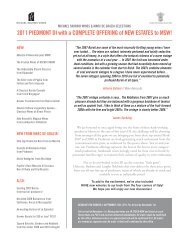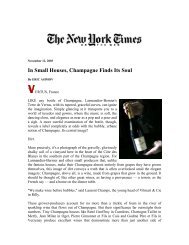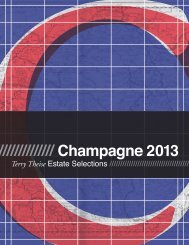German Catalog 2006 USE THIS ONE.qxp - Michael Skurnik Wines
German Catalog 2006 USE THIS ONE.qxp - Michael Skurnik Wines
German Catalog 2006 USE THIS ONE.qxp - Michael Skurnik Wines
You also want an ePaper? Increase the reach of your titles
YUMPU automatically turns print PDFs into web optimized ePapers that Google loves.
16<br />
Core-List <strong>Wines</strong><br />
The core-list, with which we have been very successful,<br />
was created to ensure greater continuity and help you<br />
build brands. It began as an empirical record of having<br />
consistently selected a certain wine over many years. The<br />
wine needed to be in “good” supply (by small-batch standards).<br />
Yet for all that it’s been fabulously received, it’s<br />
created many “candid exchanges of views” (in the parlance<br />
of diplomacy) among my staff and me. I want you to<br />
know this: no wine will be offered merely because it’s on the<br />
core-list. Every wine will continue to earn its way into this<br />
offering. In the (extremely unlikely!) event a core-list wine<br />
is yucky in the new vintage, off it goes. If we’ve done our<br />
jobs properly, that will almost never happen.<br />
Dry <strong>German</strong> <strong>Wines</strong><br />
Last year I wrote this sentence: “There are people<br />
who like bitter flavors, but I don’t believe disproportionate<br />
millions of them happen to live in <strong>German</strong>y.”<br />
This year I am starting to wonder.<br />
The <strong>German</strong>s are notoriously averse to their own<br />
(perfectly good) tap-water. I don’t recall when I’ve ever<br />
seen a <strong>German</strong> person go to the sink and draw himself a<br />
glass of water. What they drink instead is a concoction<br />
called Sprudel, which is a highly carbonated and (to most<br />
non-<strong>German</strong> palates) aggressively salty beverage. A<br />
grower in whose home we stayed gave us a bottle of<br />
Sprudel for our room, and my wife poured a glass for the<br />
bedside. The next morning I reached idly for it, took a<br />
sip, and the light-bulb went on above my head. I guess I<br />
have magic powers.<br />
The water was significantly bitter, now that it had<br />
gone flat and warmed to room-temp. Almost every<br />
<strong>German</strong> drinks such waters from his earliest childhood.<br />
And so I find myself wondering whether this might<br />
explain their singular attachment to bitterness. Could it<br />
be such a deep part of their essential aesthetic imprinting<br />
they do not in fact see it discretely?<br />
Because the basic rap against dry <strong>German</strong> Rieslings<br />
is too many of them are shrill and bitter. I detest such<br />
wines and don’t select them. Yet I do select good dry<br />
<strong>German</strong> wines whenever I encounter them — rare as that<br />
may be. Thus I was interested to see the last Gault-Millau<br />
(probably the leading <strong>German</strong>-language wine guide) and<br />
its list of the best dry Rieslings of the 2003 vintage. Tied<br />
for 2nd was a Leitz wine I selected. Tied for third was a<br />
Spreitzer wine I selected. I know the Trocken wines I’m<br />
selecting are literally extraordinary. The prevailing<br />
human palate will usually reject that which is inherently<br />
unpleasant. Yet with exquisite perversity, The <strong>German</strong>s<br />
wish to establish their market on inherently unpleasant<br />
wines.<br />
Gault-Millau likes to do what they call a Ten Years<br />
After tasting. (No, this doesn’t involve Alvin Lee in any<br />
way I’m aware of.) Armin Diel told me when they tasted<br />
the top-rated Trocken wines of the 1994 vintage “It was<br />
striking to see how thin and sour many of them were<br />
Are today’s german wines being “raped into dryness”?<br />
compared to the wines we’re making now.” He is quite<br />
correct; modern <strong>German</strong> dry Rieslings have improved in<br />
the last decade. Yet I wonder whether tasting today’s<br />
wines in ten years will bring about yet another moment<br />
of perspective and clarity.<br />
There’s a certain amount of chatter about increasing<br />
U.S. market demand for Trocken Rieslings. Though I<br />
offered more of them last year than ever before and will<br />
offer even more of them here, I don’t see it. Last year I<br />
offered an exquisitely balanced and fascinating “feinherb”<br />
Spätlese from Kerpen, a nearly perfect dry (or dry<br />
enough) Riesling, and ya wanna know how much y’all<br />
bought of it? Two cases, dude. We showed the wine in<br />
every DI tasting, including those visited by Martin<br />
Kerpen himself, at his own table, commanding your<br />
exclusive attention, and I’m sure at least 1000 of you tasted<br />
the wine. And two of you ordered it. “Demand”.<br />
I have no doubt there are more successful Trocken<br />
Rieslings than ever, though it’s hardly difficult to have<br />
produced “more” from such a teensy base. I also agree<br />
the ones that do succeed are legitimately world-class dry<br />
Rieslings which needn’t shrink from comparison to<br />
Austria’s and Alsace’s best. That said, these are still<br />
smaller in number than their proponents would have<br />
you believe. And the whole matter is rife with groupthink<br />
and dogma, such that the Pfalz has been suffocated<br />
by adherence to an ironclad formula. But let’s take a<br />
step back.<br />
Dry <strong>German</strong> Riesling is a worthwhile variation of<br />
the theme. It would properly occupy about 15% of the<br />
total production of <strong>German</strong> Riesling, and be prized for<br />
its particular virtues. At 50-degrees N. latitude, with a<br />
late-ripening high-acid grape, it’s thrilling to beat the<br />
odds and make a good dry wine.<br />
Would it were so.<br />
I think that fifty years from now some wine historian<br />
will write a book about the strange phenomenon that<br />
gripped <strong>German</strong> wine drinkers in the last quarter of the<br />
twentieth century. RAPED INTO DRYNESS could be the<br />
title (and thanks to Armin Diel for the wonderful<br />
phrase!).<br />
“Yes, we can shake our heads in bewilderment now,<br />
since the plague has passed and things are normal
















